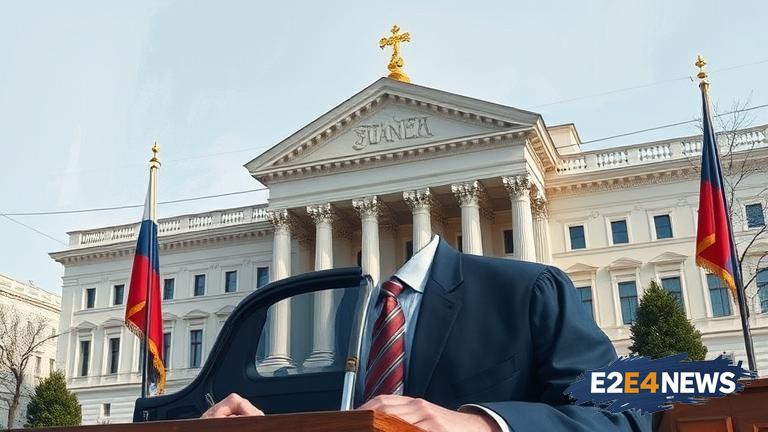In a move that has sent shockwaves through Russia’s legal community, Prosecutor General Igor Krasnov is poised to take the reins as the head of the Supreme Court. This development has raised eyebrows among observers, who worry about the potential erosion of the judiciary’s independence. Krasnov, a stalwart ally of President Vladimir Putin, has been a key figure in the Russian government’s efforts to consolidate power and suppress dissent. As Prosecutor General, he has overseen numerous high-profile cases, including the prosecution of opposition figures and activists. His appointment to the Supreme Court is seen as a strategic move to further entrench the government’s control over the judiciary. The Supreme Court, as the highest court in the land, plays a crucial role in shaping Russia’s legal landscape and ensuring that the government remains accountable to the law. With Krasnov at the helm, many fear that the court will become increasingly politicized, leading to a decline in the rule of law and the erosion of civil liberties. The Russian government has long been criticized for its heavy-handed approach to justice, and Krasnov’s appointment is likely to exacerbate these concerns. As the new head of the Supreme Court, Krasnov will have significant influence over the court’s decisions and direction, potentially allowing the government to exert even greater control over the judiciary. This could have far-reaching consequences for Russia’s already beleaguered opposition, as well as for the country’s international reputation. The move has been met with widespread criticism from human rights groups and legal experts, who argue that Krasnov’s appointment undermines the independence of the judiciary and threatens the principles of justice and fairness. Despite these concerns, the Russian government appears determined to push ahead with Krasnov’s appointment, which is seen as a key part of its efforts to consolidate power and suppress dissent. The implications of this move are likely to be felt for years to come, and will undoubtedly have significant consequences for Russia’s legal system and its people. As the country continues to grapple with the challenges of governance and the rule of law, the appointment of Krasnov as head of the Supreme Court is a stark reminder of the ongoing struggle for justice and accountability in Russia. The international community will be watching closely as this situation unfolds, and will likely be weighing in with their own assessments and criticisms. In the meantime, Russians will be waiting with bated breath to see how this development will impact their country’s future. With the Supreme Court now firmly under the control of a key Putin ally, the prospects for justice and accountability in Russia look increasingly bleak. The appointment of Krasnov is a clear indication that the Russian government is committed to maintaining its grip on power, regardless of the cost to the country’s legal system or its people. As the news of Krasnov’s appointment continues to send shockwaves through Russia, it remains to be seen how the international community will respond to this development. One thing is certain, however: the appointment of Igor Krasnov as head of the Supreme Court marks a significant turning point in Russia’s ongoing struggle for justice and accountability. The coming months and years will be crucial in determining the ultimate impact of this move, and the world will be watching with great interest as this situation continues to unfold. In the end, the fate of Russia’s judiciary, and the country’s commitment to the rule of law, hangs in the balance. The appointment of Krasnov is a stark reminder that the struggle for justice and accountability is ongoing, and that the outcome is far from certain. As Russia continues to navigate the complexities of governance and the rule of law, the international community will be watching closely to see how this situation develops. The implications of Krasnov’s appointment will be felt for years to come, and will undoubtedly have significant consequences for Russia’s legal system, its people, and the wider world.
